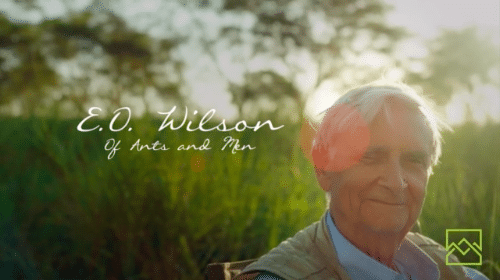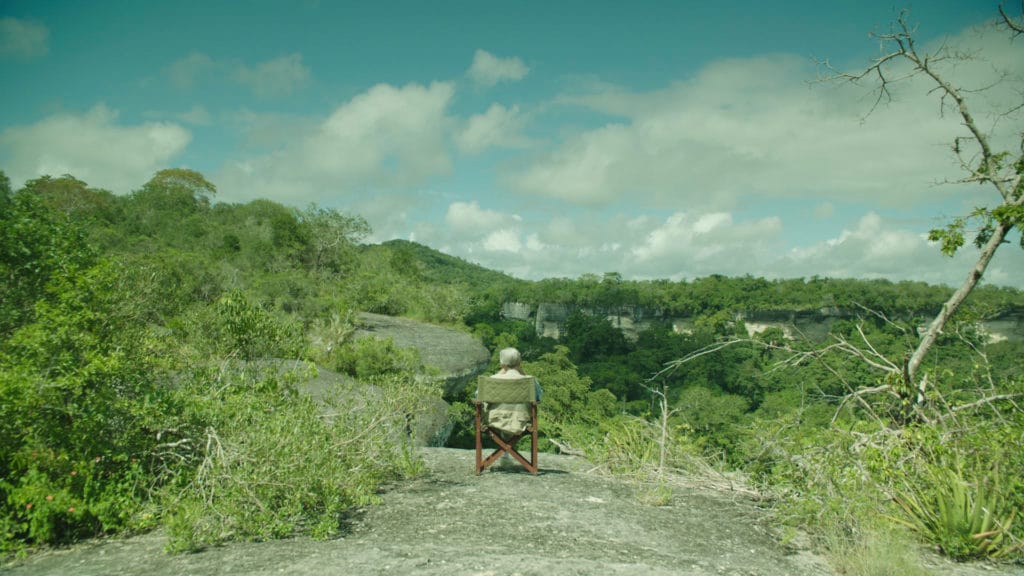Graham Townsley: Confessions of an Environmental Filmmaker
This speech was delivered by filmmaker Graham Townsley on Thursday, October 6, 2016 at the Environmental Film Festival’s annual benefit luncheon, which took place at Restaurant Nora in Washington, DC.
I have to make a confession at the outset, I have never really considered myself an environmental filmmaker or a natural history filmmaker or even a conservation filmmaker. Most of my documentaries have been ethnographic films or about anthropology or ancient history. But I recently had the honor of making a film about the great biologist and conservationist, E. O. Wilson.
That film really changed me.
[WATCH ‘E. O. WILSON: OF ANTS AND MEN’ TRAILER]
Ed has of course inspired many people to think about conservation in a new way and he inspired me to do the same. A lot of what I am going to say today comes out of that process of thinking again about the environment and, above all, about how conservation messages are conveyed.
I am struck by a central enigma: How is it that so many people are resistant to the simple, common sense messages of environmentalism? It just seems such a paradox that as threats to the environment increase and get ever more apocalyptic, so many people can just ignore them, roll over and go back to sleep.
I have another confession, though. I used to be one of them – at least when it came to natural history and conservation films. I often found them boring – or if not boring, slightly irritating. I rarely made it past the 10-minute mark.
But I didn’t switch off on conservation films because I don’t love animals or nature. On the contrary, when I was young they were my obsessions. My greatest ambition was to work in a zoo like my hero, Gerald Durrell – who was a big figure in England at the time. I remember I collected a magazine they published in England called Animal Magazine, which was entirely made up of beautiful pictures of animals from around the world. How I loved that magazine! How those pictures fed my imagination! While a lot of my friends were starting to put pictures of Raquel Welch on their walls, I was plastering images of leopards and orangutans. Looking back, I think what I loved about them was that they made me dream. They allowed me to feast my eyes on these beautiful, mysterious creatures without anybody telling me what to think about them.
I was free to imagine.
So where, you may ask, did it all go wrong for me? Well, the answer, of course, is that unlike those beautiful still photos, environmental films require a narrative. And it’s those typical natural history/conservation narratives that tend to send me off the rails.
But, you might say, they are usually so well intentioned, so celebratory of the natural world, so urging of us to get on board of an undeniably good cause.
What’s not to like about environmental films?
Well, allow me to present you with a short list of my gripes. By and large, I’ve observed that films about conservation are —
1) Mawkish. In searching for a narrative, environmental filmmakers often latch onto the sweet, funny family saga, making a sort of Everybody Loves Raymond of the natural world. These films dwell on the cuteness of little animals and the struggles of mum and dad to bring them up, and so on. The idea is that that this should make it easy for us humans to relate to the story but actually it shuts some of us out – not because we’re twisted, cynical souls – but because it so blatantly projects our own ideologies and wishes onto the natural world. Animals don’t live in happy, loving nuclear families anymore than humans do. Why are we encouraged to imagine them like that?
2) Creepy. The other narrative derailment I suffer in some natural history films is their weird and creepy celebration of animal predators. In these films, animals become pitiless killing machines and nature, a dog-eat-dog dystopia of non-stop slaughter – as if leopards were in a Blade Runner or Jason Bourne movie. These are powerful fantasies manifesting our anxieties about human nature but have nothing to do with “Nature.” Anytime the natural world becomes a projection screen for our own feelings, insecurities and desires, we miss out on its strangeness, its beauty and mystery.
3) Preachy. Perhaps, the biggest and most serious deterrent to watching environmental films is their all too frequent PC moralizing. They all seem to emerge from the same political and cultural universe. The world of conservation, as we know, is overwhelmingly white, liberal, democrat and secular. As a result, conservation films reek of that world’s values. And, though there’s nothing innately wrong with any of them, it’s important to note that many people, who love nature and animals, come from entirely different backgrounds and don’t share those values.
It just feels to them like environmentalism doesn’t speak their language.
The sad fact is that no narrative is innocent. Each narrative carries a lot of cultural messages and attitudes, even if they are not explicit. But it is really hard to fashion narratives that speak to a wide audience. Which brings me full circle to Ed Wilson and his uncanny knack of talking to the whole world.
How does he do it?
One reason for his amazing popularity here in the US, I think, is that in his own life he has straddled America’s great cultural divide. He has in some ways become a secular, east coast liberal – Harvard professor and so forth – but he grew up in a deeply conservative, Christian world in Alabama and still knows how to speak its language. His conception of environmentalism is so grand and philosophical that its almost religious itself – which is why people love it.
In our travels together for the film, [E.O. Wilson of Ants and Men] I was so struck by how easily he could speak to people from conservative religious worlds about the environment in a way that immediately engaged their enthusiasm and curiosity. He instinctively knew how to welcome them into the tent, how to speak their language.
And beyond his capacity to straddle America’s great cultural divide there is something he communicates that speaks to everybody whatever their cultural background – his absolutely innocent, child-like love of the natural world. I don’t think anyone he encounters is immune to it. Like those photos from animal magazine on my wall, he has this uncanny ability to free people to imagine the natural world in their own way, to make them feel what it would be like to fall in love with nature whatever your culture or religion.
And that, I guess, is the key to the types of narrative that might expand the reach of environmentalism. We can’t of course all be Ed Wilson but we can learn something from him about not getting locked into the bubble of our particular belief system – and at least make the effort to reach beyond it.
Thank you.
Graham Townsley is an Emmy-nominated director of high-end documentaries for PBS, National Geographic and the Discovery channel. He trained as an anthropologist and has a Ph.D from Cambridge University. Two of his films have been featured in the Environmental Film Festival: Landfillharmonic in 2015, and E.O. Wilson: Of Ants and Men in 2016. Learn more about Graham and his work here.
Find the Environmental Film Festival on Facebook, Twitter and Instagram for more film and event updates. Follow #DCEFF to stay connected with the Festival.




